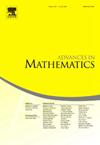The Rees algebra and analytic spread of a divisorial filtration
IF 1.5
1区 数学
Q1 MATHEMATICS
引用次数: 0
Abstract
In this paper we investigate some properties of Rees algebras of divisorial filtrations and their analytic spread. A classical theorem of McAdam shows that the analytic spread of an ideal I in a formally equidimensional local ring is equal to the dimension of the ring if and only if the maximal ideal is an associated prime of for some n. We show in Theorem 1.5 that McAdam's theorem holds for -divisorial filtrations in an equidimensional local ring which is essentially of finite type over an excellent local ring of dimension less than or equal to 3. This generalizes an earlier result for -divisorial filtrations in an equicharacteristic zero excellent local domain by the author. This theorem does not hold for more general filtrations.
We consider the question of the asymptotic behavior of the function for a -divisorial filtration of -primary ideals on a d-dimensional normal excellent local ring. It is known from earlier work of the author that the multiplicity can be irrational. We show in Lemma 4.1 that the limsup of the first difference function is always finite for a -divisorial filtration. We then give an example in Section 4 showing that this limsup may not exist as a limit.
In the final section, we give an example of a symbolic filtration of a prime ideal P in a normal two dimensional excellent local ring which has the property that the set of Rees valuations of all the symbolic powers of P is infinite.
除法过滤的Rees代数和解析展开
本文研究了分滤的Rees代数的一些性质及其解析扩张性。麦克阿当经典定理表明,理想的我在一个正式的分析传播等维度的局部环等于环当且仅当的维数相关的最大理想是一个主要的R /‾n。我们在定理1.5 McAdam定理适用于Q-divisorial过滤的等轴的局部环有限类型的本质上是在一个优秀的局部环的尺寸小于或等于3。这推广了作者在等特征零优局部域上关于q分滤波的先前结果。这个定理不适用于更一般的过滤。研究了d维正规优局部环上mr -初等理想的q分滤波I={In}的函数n∈λR(R/In)的渐近性。从作者早期的工作中可以知道,乘数ye(I)=d!limn→∞(R/In)和可以是无理数。在引理4.1中,我们证明了对于q分滤波,第一差分函数limsupn→∞λR(in / in +1)和−1的极限值总是有限的。然后,我们在第4节中给出一个例子,表明这个极限可能不存在。在最后一节中,我们给出了一个正常二维优局部环上素数理想P的符号过滤{P(n)}的例子,它具有P的所有符号幂P(n)的Rees赋值集是无限的性质。
本文章由计算机程序翻译,如有差异,请以英文原文为准。
求助全文
约1分钟内获得全文
求助全文
来源期刊

Advances in Mathematics
数学-数学
CiteScore
2.80
自引率
5.90%
发文量
497
审稿时长
7.5 months
期刊介绍:
Emphasizing contributions that represent significant advances in all areas of pure mathematics, Advances in Mathematics provides research mathematicians with an effective medium for communicating important recent developments in their areas of specialization to colleagues and to scientists in related disciplines.
 求助内容:
求助内容: 应助结果提醒方式:
应助结果提醒方式:


